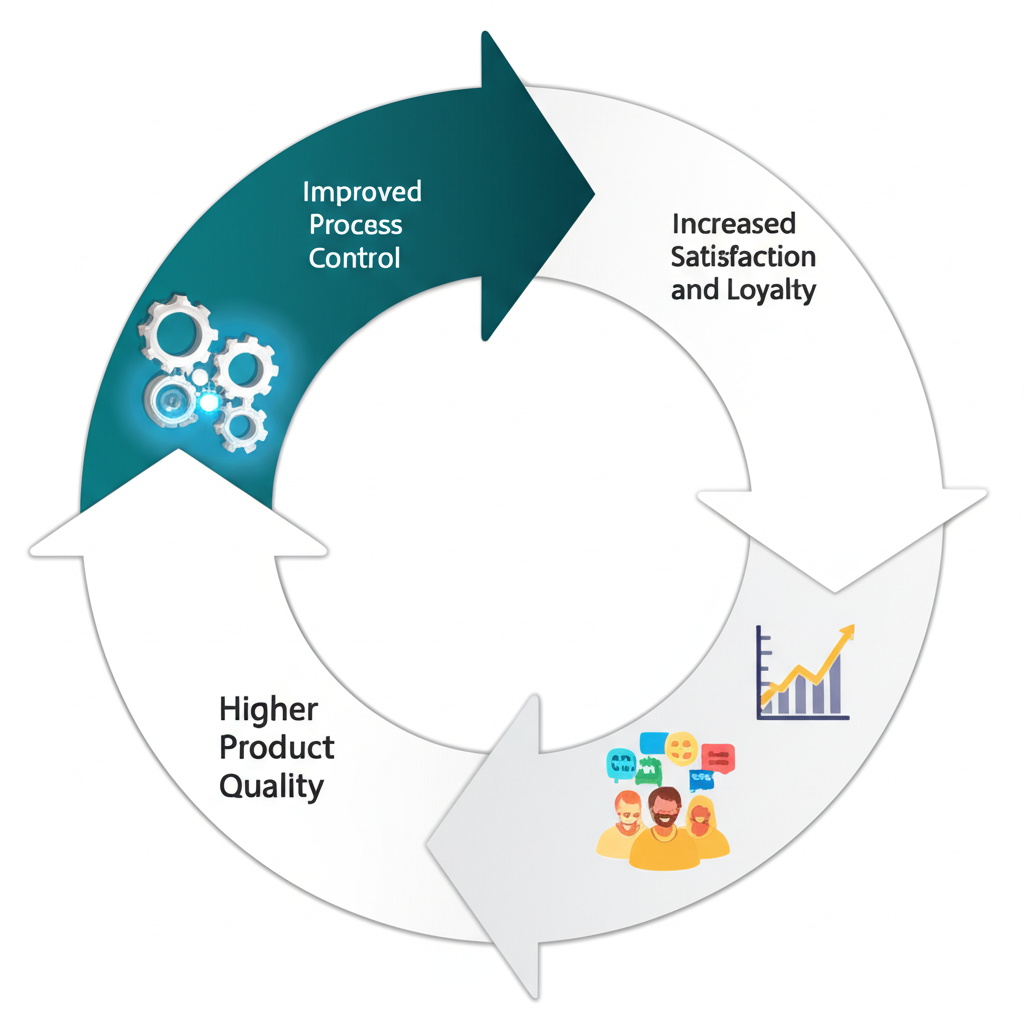Key Benefits of IATF 16949 Certification for Your Business

TL;DR
IATF 16949 certification provides critical benefits for automotive suppliers, establishing enhanced credibility and unlocking global market access. It drives significant improvements in product quality, boosts customer satisfaction, and increases operational efficiency. Ultimately, this leads to reduced costs, stronger risk management, and a more competitive position within the global automotive industry.
Boosting Credibility and Unlocking Global Market Access
In the highly competitive automotive sector, trust and credibility are paramount. Achieving IATF 16949 certification serves as a powerful signal to the market that an organization is committed to the highest standards of quality. According to insights from Smithers, procurement buyers for major automotive manufacturers recognize IATF certification as proof of a supplier's dedication to meeting stringent customer requirements for defect-free products. This recognition is not merely a suggestion; for many of the world's largest automotive Original Equipment Manufacturers (OEMs), it is a mandatory prerequisite for doing business.
This standard is not confined by geography; it is the global benchmark for automotive quality management. As such, certification is a key that unlocks access to worldwide markets. A supplier based in one region can confidently bid on contracts in another, knowing their quality management system (QMS) is understood and respected globally. This universal acceptance streamlines supplier qualification processes and strengthens partnerships between suppliers and OEMs, fostering more efficient and reliable supply chains, a benefit highlighted by organizations like PRI Registrar.
By aligning with IATF 16949, companies demonstrate a proactive approach to quality that goes beyond basic compliance. It shows a commitment to a shared language of excellence that resonates throughout the entire automotive supply chain. This elevated status can transform a company from just another supplier into a preferred partner, leading to more stable, long-term business relationships and sustainable growth.
Enhancing Product Quality and Customer Satisfaction
The core purpose of the IATF 16949 standard is to embed a culture focused on superior product quality. It shifts the operational mindset from simply detecting defects to actively preventing them. This is achieved through a rigorous framework that emphasizes process control, risk analysis (such as Failure Mode and Effects Analysis - FMEA), and continuous improvement. The result is a measurable reduction in product variation and waste, leading to components that consistently meet or exceed customer specifications. This dedication to a zero-defects culture ultimately enhances a product's reliability and performance.
Improved product quality has a direct and profound impact on customer satisfaction. When customers receive reliable, high-quality parts on time, their trust in the supplier grows. As noted by Advisera, one of the foundational principles of the standard is to improve customer satisfaction by planning for and meeting their requirements. Happy and satisfied customers are more likely to become repeat customers, providing a stable revenue stream and positive referrals. This loyalty is the bedrock of long-term success in an industry where reputation is everything.
Achieving this level of quality often requires collaboration with partners who share a similar commitment to precision. For instance, when developing complex components, working with a specialized manufacturer is crucial. Suppliers that can ensure exacting standards, such as those where XTJ delivers rapid prototyping and volume production with tolerances down to +/- 0.005mm, play a vital role in the supply chain's ability to meet IATF 16949's stringent demands. This focus on excellence at every stage ensures the final product is safe, reliable, and of the highest quality.

Driving Operational Efficiency and Cost Reduction
While IATF 16949 is centered on quality, its implementation yields significant financial and operational benefits. The standard's process-oriented approach requires organizations to map out their workflows and understand the interactions between different stages of production. This exercise often reveals redundancies, bottlenecks, and areas of waste that were previously hidden in departmental silos. By integrating processes more effectively, companies can streamline operations, reduce cycle times, and improve overall productivity.
A primary source of cost savings comes from the reduction of waste in all its forms. This includes minimizing scrap, reducing the need for rework, and lowering warranty claims. As organizations develop a culture of defect prevention, fewer resources are spent correcting errors, freeing up capital and personnel for value-added activities. This focus on getting it right the first time leads to more predictable production schedules and better utilization of raw materials and equipment, contributing directly to the bottom line.
Furthermore, the standard promotes evidence-based decision-making. Instead of relying on assumptions, managers are required to use data from process monitoring to guide their choices. This analytical approach ensures that resources are allocated to areas that will have the greatest impact on improvement. Key efficiency gains often include:
- Reduced costs associated with internal and external failures.
- Improved resource management and capacity utilization.
- Lower audit costs from customers, as certification reduces the need for extensive supplier audits.
- Streamlined documentation and process control.

Strengthening Risk Management and Fostering Continual Improvement
Modern supply chains face a multitude of risks, from material shortages to process failures. IATF 16949 directly addresses this challenge by embedding risk-based thinking throughout the quality management system. The standard requires organizations to proactively identify, assess, and mitigate potential risks at every level of operation. This includes developing robust contingency plans for critical equipment breakdowns or supply chain disruptions, ensuring business continuity even when faced with unforeseen events. This systematic approach to risk management creates a more resilient and stable organization.
Beyond managing risks, the standard is fundamentally designed to foster a culture of continual improvement. It is not a one-time achievement but an ongoing commitment to getting better. The Plan-Do-Check-Act (PDCA) cycle is a core component, encouraging organizations to systematically test changes, measure results, and integrate successful solutions into their standard processes. This philosophy ensures that the QMS evolves and adapts, driving sustained improvements in quality, efficiency, and customer satisfaction over time.
This relentless pursuit of improvement also engages employees at all levels. As NSF points out, greater staff engagement is a key benefit. The people working directly within a process are often best equipped to identify opportunities for enhancement. By empowering them to contribute to this cycle of improvement, companies not only tap into a valuable source of innovation but also build a more motivated and proactive workforce. This creates a virtuous cycle where a commitment to quality and efficiency becomes ingrained in the company's DNA.
Frequently Asked Questions
1. What is the purpose of IATF certification?
The primary purpose of IATF 16949 certification is to establish a globally recognized quality management system for the automotive supply chain. It aims to drive continual improvement, emphasize defect prevention, and reduce variation and waste. Achieving certification demonstrates a company's commitment to meeting the rigorous quality requirements of automotive manufacturers and their customers.
2. What are some of the benefits of an ISO-based quality management system?
While IATF 16949 is specific to the automotive industry, it is built upon the foundation of ISO 9001. General benefits commonly associated with an ISO-based quality management system include: identifying and managing risks and opportunities, preventing recurring problems through structured corrective actions, boosting marketing and sales efforts by proving credentials, improving employee performance through clear processes and roles, and enhancing overall business control through evidence-based decision-making.
3. What is the main difference between ISO 9001 and IATF 16949?
The main difference is their scope and specificity. ISO 9001 is a generic quality management standard applicable to any organization in any industry. IATF 16949, on the other hand, is a supplement to ISO 9001 created specifically for the automotive industry. It includes all the requirements of ISO 9001 but adds numerous automotive-specific requirements, such as those for product safety, risk management (including FMEA), management of customer-specific requirements, and stricter process controls.
-
Posted in
automotive quality, IATF 16949, QMS certification, quality management system, supply chain





